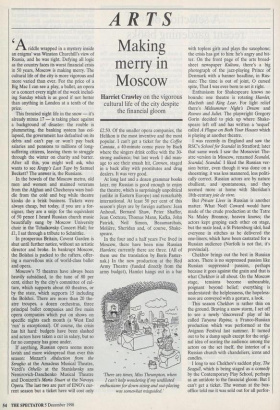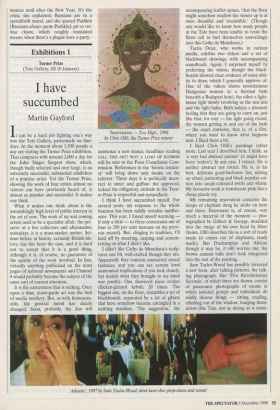ARTS
Making merry in Moscow
Harriet Crawley on the vigorous cultural life of the city despite the financial gloom Ariddle wrapped in a mystery inside an enigma' was Winston Churchill's view of Russia, and he was right. Defying all logic as the country faces its worst financial crisis in 50 years, Moscow is making merry. The cultural life of the city is more vigorous and more varied than ever. For the price of a Big Mac I can see a play, a ballet, an opera or a concert every night of the week includ- ing Sunday which is as good if not better than anything in London at a tenth of the price.
This frenzied night life in the snow — it's already minus 17 — is taking place against a background of disaster: the rouble is plummeting, the banking system has col- lapsed, the government has defaulted on its debts and can't pay or won't pay back salaries and pensions to millions of long- suffering citizens, leaving them to struggle through the winter on charity and barter. After all this, you might well ask, who wants to see Krapp's Last Tape by Samuel Beckett? The answer is, the Russians.
In the bowels of the Moscow metro, old men and women and maimed veterans from the Afghan and Chechenya wars hud- dle from the cold and beg while theatre kiosks do a brisk business. Tickets were always cheap, but today, if you are a for- eigner, they are a snip: for the equivalent of 50 pence I heard Russian church music beautifully sung by Moscow University choir in the Tchaikovsky Concert Hall; for £1, I sat through a tribute to Schnittke.
In prosperous Britain, Covent Garden is shut until further notice, without an artistic director and broke. In bankrupt Moscow, the Bolshoi is packed to the rafters, offer- ing a marvellous mix of world-class ballet and opera.
Moscow's 75 theatres have always been heavily subsidised, to the tune of 80 per cent, either by the city's committee of cul- ture, which supports about 60 theatres, or by the state, which supports 15 including the Bolshoi. There are more than 20 the- atre troupes, a dozen orchestras, three principal ballet companies and five main opera companies which put on shows on specific nights each month (a West End `run' is exceptional). Of course, the crisis has hit hard: budgets have been slashed and actors have taken a cut in salary, but so far no company has gone under.
If anything, Russian opera seems more lavish and more widespread than ever this season: Mozart's Abduction from the Seraglio at the Amadeus Musical Theatre, Verdi's Othello at the Stanislaysky ans Nemirovich-Danchenko Musical Theatre and Donizetti's Maria Stuart at the Novaya Opera. The last two are part of ENO's cur- rent season but a ticket here will cost only £2.50. Of the smaller opera companies, the Helikon is the most inventive and the most popular. I can't get a ticket for the Coffee Cantata, a 40-minute comic piece by Bach where the singers drink coffee with the 30- strong audience; but last week I did man- age to see their smash hit, Carmen, staged in a back alley with prostitutes and drug dealers. It was very good.
At long last and a dozen grammar books later, my Russian is good enough to enjoy the theatre, which is surprisingly unpolitical (unlike in Eastern Europe) and remarkably international. At least 50 per cent of this season's plays are by foreign authors: Jean Anhouil, Bernard Shaw, Peter Shaffer, Jean Cocteau, Thomas Mann, Kafka, John Patrick, Neil Simon, Beaumarchais, Moliere, Sheridan and, of course, Shake- speare.
In the four and a half years I've lived in Moscow, there have been nine Russian Hamlets; currently there are three. (All of them use the translation by Boris Paster- nak.) In the new production at the Red Army Theatre (funded directly from the army budget), Hamlet hangs out in a bar `There are times, Miss Thrumpton, when I can't help wondering if my undiluted enthusiasm for down-sizing and out-placing was somewhat misguided.' with topless girls and plays the saxophone; the crisis has got to him: he's angry and bit- ter. On the front page of the arts broad- sheet newspaper Kultura, there's a big photograph of the jazz-playing Prince of Denmark with a banner headline, in Rus- sian: The time is out of joint, 0 cursed spite, That I was ever born to set it right.
Enthusiasm for Shakespeare knows no bounds: one theatre is rotating Hamlet, Macbeth and King Lear. For light relief there's Midsummer Night's Dream and Romeo and Juliet. The playwright Gregory Gorin decided to pick up where Shake- speare left off and has written a 'sequel' called A Plague on Both Your Houses which is playing at another theatre.
I was recently in England and saw the RSC's School for Scandal in Stratford; later that same week I saw the Mossoviet The- atre version in Moscow, renamed Scandal, Scandal, Scandal. I liked the Russian ver- sion better, even though it was done on a shoestring; it was less mannered, less politi- cally correct. Russian actors are by nature ebullient, and spontaneous, and they seemed more at home with Sheridan's 18th-century joie de vivre.
But Private Lives in Russian is another matter. What Noel Coward would have made of the crude production at the Tatre Na Maloy Bronnoy, heaven knows; the actors kept groping each other on stage, but the male lead, a St Petersburg idol, had everyone in stitches as he delivered the one-liners, which have been castrated for a Russian audience (Norfolk is not flat, it's provincial).
Chekhov brings out the best in Russian actors. There is no suppressed passion like Russian suppressed passion, perhaps because it goes against the grain and that is what Chekhov is all about. On the Moscow stage, tensions become unbearable, poignant beyond belief; everything is understated: the helplessness, the hopeless- ness are conveyed with a gesture, a look.
This season Chekhov is rather thin on the ground. Braving a snow storm, I set off to see a newly 'discovered' play of his called Tatyana Repina, a Franco-Russian production which was performed at the Avignon Festival last summer. It turned out to be a damp squib except for the origi- nal idea of seating the audience among the actors on the set itself, the interior of a Russian church with chandeliers, icons and candles.
I long to see Chekhov's saddest play, The Seagull, which is being staged as a comedy by the Contemporary Play School, perhaps as an antidote to the financial gloom. But I can't get a ticket. The woman at the box- office told me it was sold out for all perfor- mances until after the New Year. It's the crisis, she explained; Russians are in a spendthrift mood, and she quoted Pushkin (Russians always quote Pushkin): pir vo vre- mya chymi, which roughly translated means: when there's a plague have a party.



















































































 Previous page
Previous page